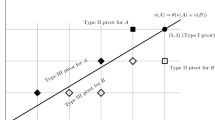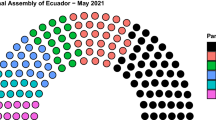Abstract.
Strong assumptions are usually needed to guarantee the existence of a Condorcet winner in majority voting games. The theoretical literature has developed various solution concepts to accommodate the general absence of Condorcet winner, but very little is known on their economic implications. In this paper, I select three such concepts (the uncovered set, the bipartisan set and the minmax set), defined as game-theoretical solution concepts applied to a Downsian electoral competition game. These concepts are then computed by means of simulations in a simple model of purely redistributive taxation, where factor supply varies with net factor rewards. All three concepts give rather sharp predictions and are not too sensitive to small variations of the preference profiles.
Similar content being viewed by others
Author information
Authors and Affiliations
Additional information
Received: 29 December 1997/Accepted: 26 August 1999
Rights and permissions
About this article
Cite this article
De Donder, P. Majority voting solution concepts and redistributive taxation. Soc Choice Welfare 17, 601–627 (2000). https://doi.org/10.1007/s003550000044
Issue Date:
DOI: https://doi.org/10.1007/s003550000044




